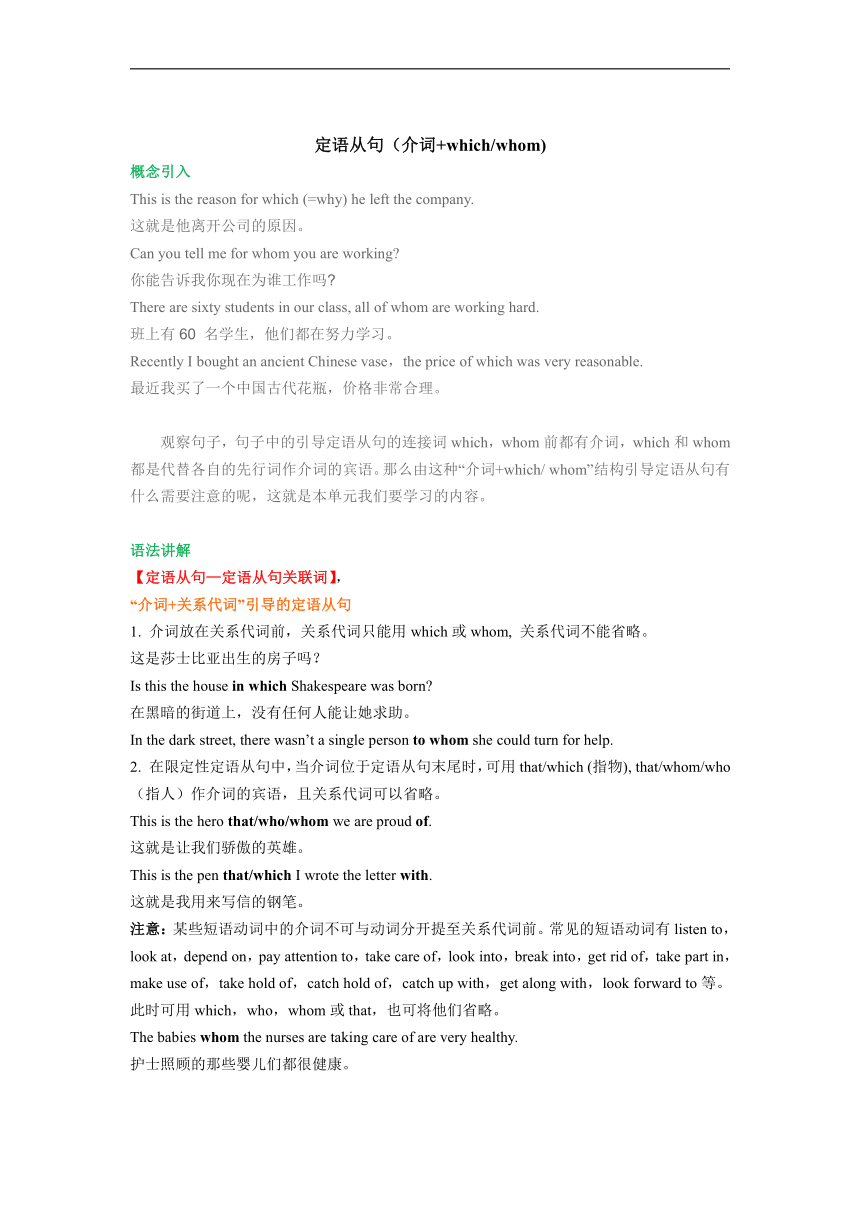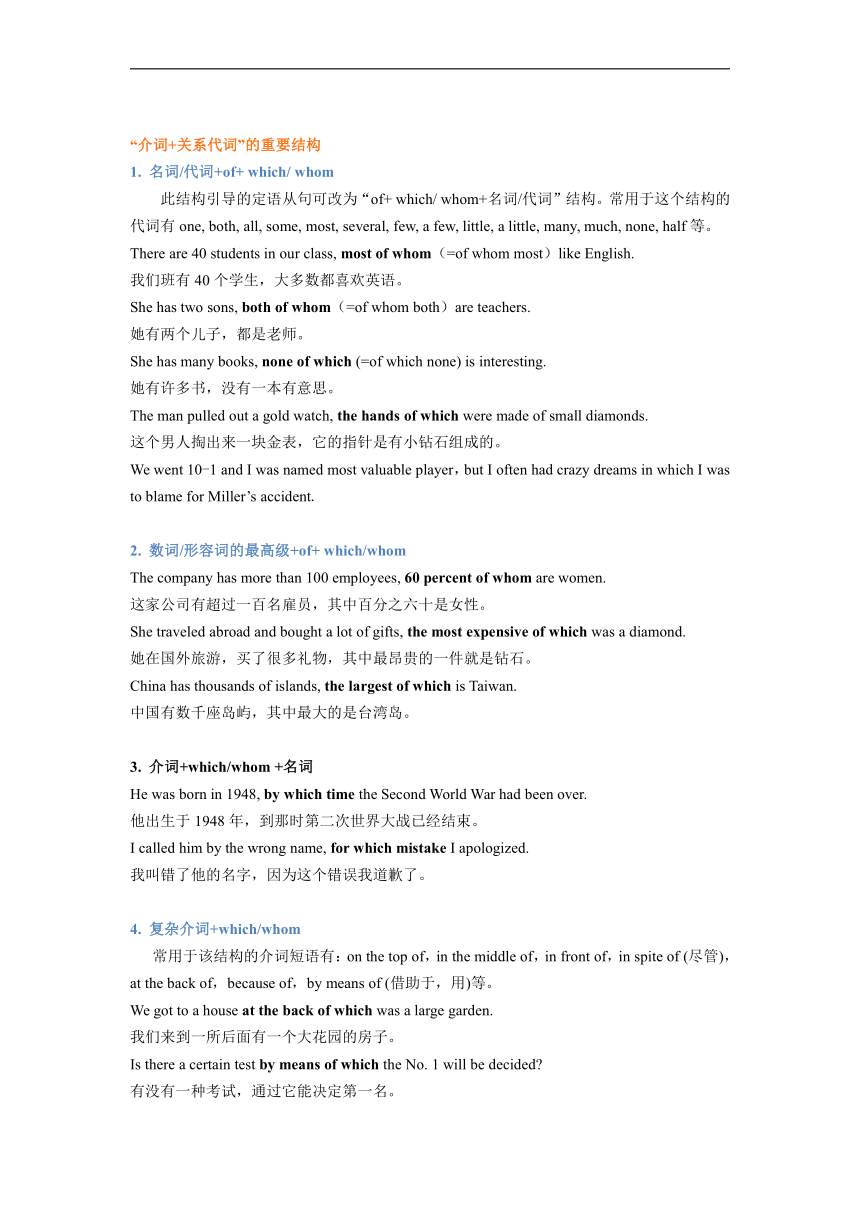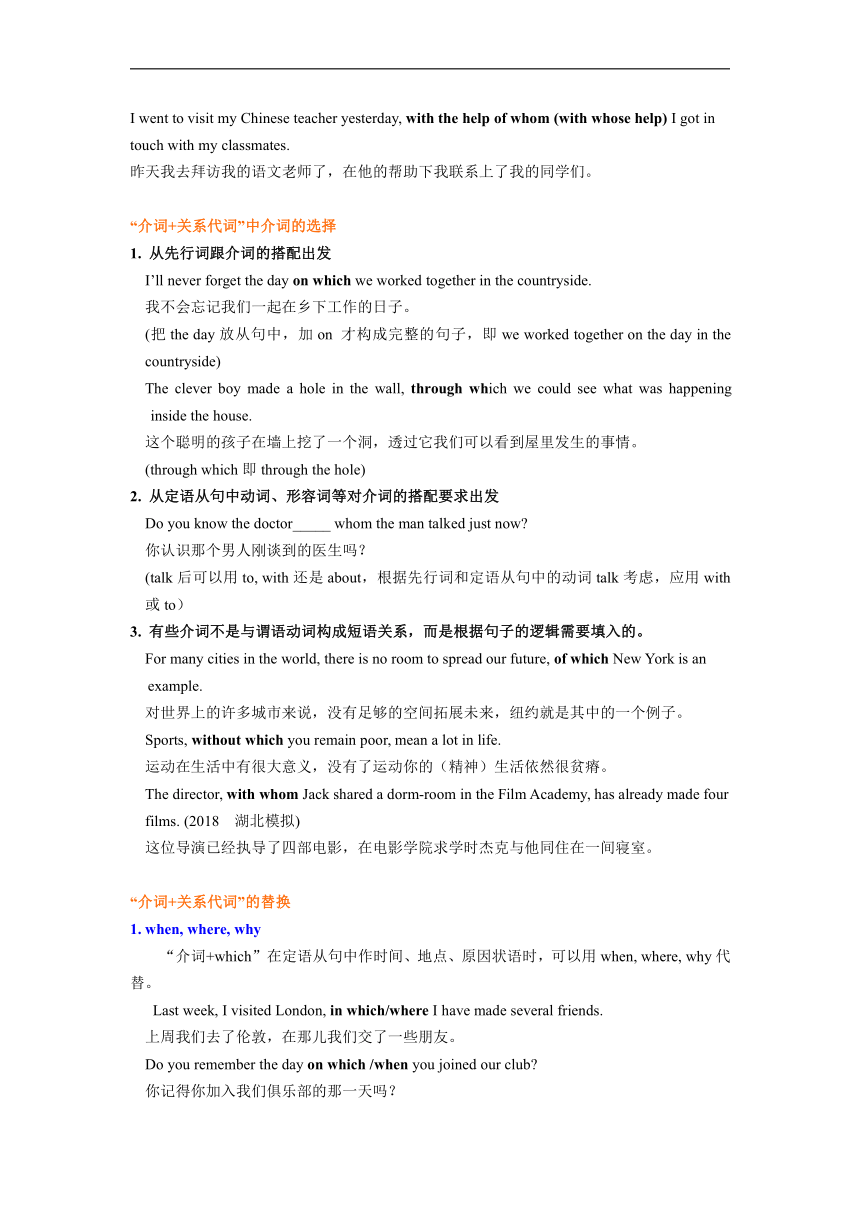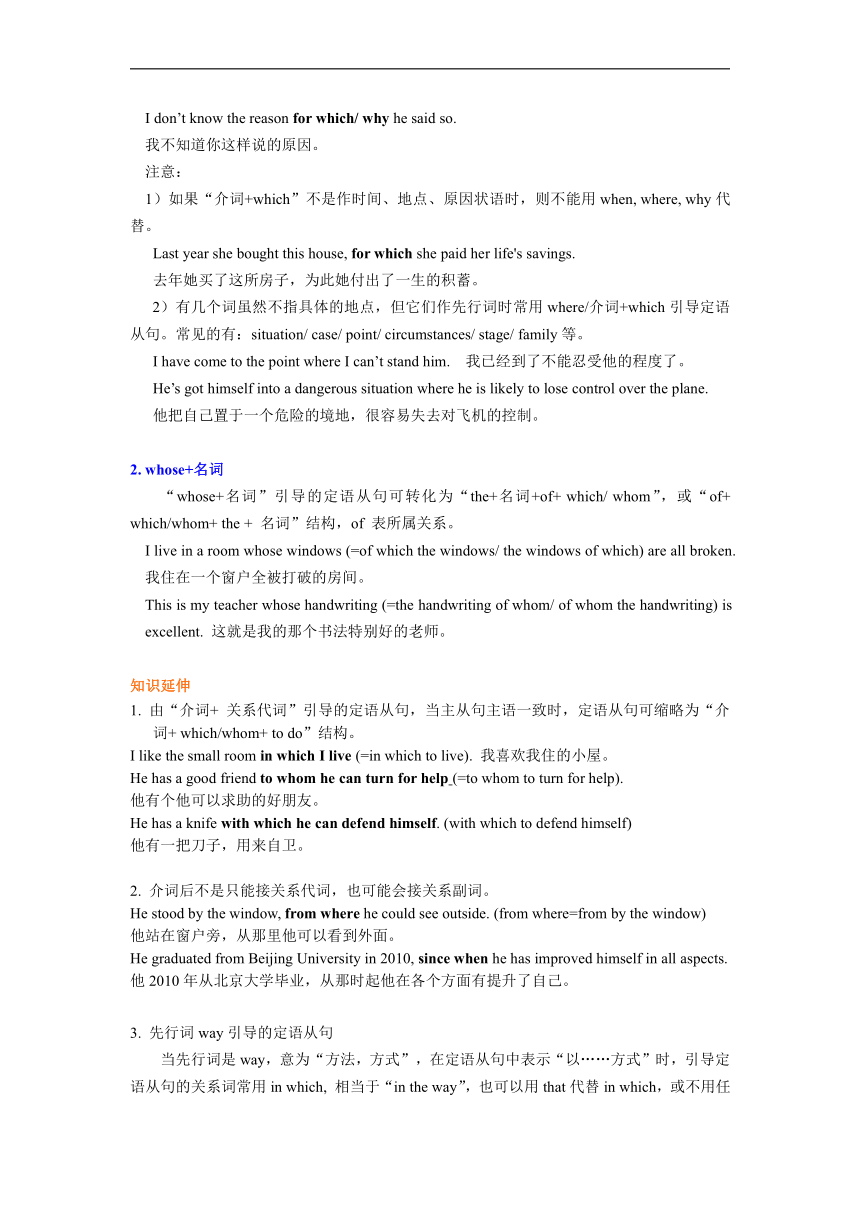(人教版)高中英语必修2:Unit 5 Music定语从句(介词 加 which_whom)及语法讲解
文档属性
| 名称 | (人教版)高中英语必修2:Unit 5 Music定语从句(介词 加 which_whom)及语法讲解 |

|
|
| 格式 | zip | ||
| 文件大小 | 37.5KB | ||
| 资源类型 | 教案 | ||
| 版本资源 | 人教版(新课程标准) | ||
| 科目 | 英语 | ||
| 更新时间 | 2019-08-14 00:00:00 | ||
图片预览




文档简介
定语从句(介词+which/whom)
概念引入
This is the reason for which (=why) he left the company. 这就是他离开公司的原因。
Can you tell me for whom you are working? 你能告诉我你现在为谁工作吗?
There are sixty students in our class, all of whom are working hard. 班上有60 名学生,他们都在努力学习。
Recently I bought an ancient Chinese vase,the price of which was very reasonable.
最近我买了一个中国古代花瓶,价格非常合理。
观察句子,句子中的引导定语从句的连接词which,whom前都有介词,which和whom都是代替各自的先行词作介词的宾语。那么由这种“介词+which/ whom”结构引导定语从句有什么需要注意的呢,这就是本单元我们要学习的内容。
语法讲解
【定语从句—定语从句关联词】,
“介词+关系代词”引导的定语从句
1. 介词放在关系代词前,关系代词只能用which或whom, 关系代词不能省略。
这是莎士比亚出生的房子吗?
Is this the house in which Shakespeare was born?
在黑暗的街道上,没有任何人能让她求助。
In the dark street, there wasn’t a single person to whom she could turn for help.
2. 在限定性定语从句中,当介词位于定语从句末尾时,可用that/which (指物), that/whom/who(指人)作介词的宾语,且关系代词可以省略。
This is the hero that/who/whom we are proud of.
这就是让我们骄傲的英雄。
This is the pen that/which I wrote the letter with.
这就是我用来写信的钢笔。
注意:某些短语动词中的介词不可与动词分开提至关系代词前。常见的短语动词有listen to,look at,depend on,pay attention to,take care of,look into,break into,get rid of,take part in,make use of,take hold of,catch hold of,catch up with,get along with,look forward to等。此时可用which,who,whom或that,也可将他们省略。
The babies whom the nurses are taking care of are very healthy.
护士照顾的那些婴儿们都很健康。
“介词+关系代词”的重要结构
1. 名词/代词+of+ which/ whom
此结构引导的定语从句可改为“of+ which/ whom+名词/代词”结构。常用于这个结构的代词有one, both, all, some, most, several, few, a few, little, a little, many, much, none, half等。
There are 40 students in our class, most of whom(=of whom most)like English.
我们班有40个学生,大多数都喜欢英语。
She has two sons, both of whom(=of whom both)are teachers.
她有两个儿子,都是老师。
She has many books, none of which (=of which none) is interesting.
她有许多书,没有一本有意思。
The man pulled out a gold watch, the hands of which were made of small diamonds.
这个男人掏出来一块金表,它的指针是有小钻石组成的。
We went 10-1 and I was named most valuable player,but I often had crazy dreams in which I was to blame for Miller’s accident.
2. 数词/形容词的最高级+of+ which/whom
The company has more than 100 employees, 60 percent of whom are women.
这家公司有超过一百名雇员,其中百分之六十是女性。
She traveled abroad and bought a lot of gifts, the most expensive of which was a diamond.
她在国外旅游,买了很多礼物,其中最昂贵的一件就是钻石。
China has thousands of islands, the largest of which is Taiwan.
中国有数千座岛屿,其中最大的是台湾岛。
3. 介词+which/whom +名词
He was born in 1948, by which time the Second World War had been over.
他出生于1948年,到那时第二次世界大战已经结束。
I called him by the wrong name, for which mistake I apologized.
我叫错了他的名字,因为这个错误我道歉了。
4. 复杂介词+which/whom
常用于该结构的介词短语有:on the top of,in the middle of,in front of,in spite of (尽管),at the back of,because of,by means of (借助于,用)等。
We got to a house at the back of which was a large garden.
我们来到一所后面有一个大花园的房子。
Is there a certain test by means of which the No. 1 will be decided?
有没有一种考试,通过它能决定第一名。
I went to visit my Chinese teacher yesterday, with the help of whom (with whose help) I got in touch with my classmates.
昨天我去拜访我的语文老师了,在他的帮助下我联系上了我的同学们。
“介词+关系代词”中介词的选择
1. 从先行词跟介词的搭配出发
I’ll never forget the day on which we worked together in the countryside.
我不会忘记我们一起在乡下工作的日子。
(把the day放从句中,加on 才构成完整的句子,即we worked together on the day in the countryside)
The clever boy made a hole in the wall, through which we could see what was happening inside the house.
这个聪明的孩子在墙上挖了一个洞,透过它我们可以看到屋里发生的事情。
(through which即through the hole)
2. 从定语从句中动词、形容词等对介词的搭配要求出发
Do you know the doctor_____ whom the man talked just now?
你认识那个男人刚谈到的医生吗?
(talk后可以用to, with还是about,根据先行词和定语从句中的动词talk考虑,应用with或to)
3. 有些介词不是与谓语动词构成短语关系,而是根据句子的逻辑需要填入的。
For many cities in the world, there is no room to spread our future, of which New York is an example.
对世界上的许多城市来说,没有足够的空间拓展未来,纽约就是其中的一个例子。
Sports, without which you remain poor, mean a lot in life.
运动在生活中有很大意义,没有了运动你的(精神)生活依然很贫瘠。
The director, with whom Jack shared a dorm-room in the Film Academy, has already made four films. (2018 湖北模拟)
这位导演已经执导了四部电影,在电影学院求学时杰克与他同住在一间寝室。
“介词+关系代词”的替换
1. when, where, why
“介词+which”在定语从句中作时间、地点、原因状语时,可以用when, where, why代替。
Last week, I visited London, in which/where I have made several friends.
上周我们去了伦敦,在那儿我们交了一些朋友。
Do you remember the day on which /when you joined our club?
你记得你加入我们俱乐部的那一天吗?
I don’t know the reason for which/ why he said so.
我不知道你这样说的原因。
注意:
1)如果“介词+which”不是作时间、地点、原因状语时,则不能用when, where, why代替。
Last year she bought this house, for which she paid her life's savings.
去年她买了这所房子,为此她付出了一生的积蓄。
2)有几个词虽然不指具体的地点,但它们作先行词时常用where/介词+which引导定语从句。常见的有:situation/ case/ point/ circumstances/ stage/ family等。
I have come to the point where I can’t stand him. 我已经到了不能忍受他的程度了。
He’s got himself into a dangerous situation where he is likely to lose control over the plane.
他把自己置于一个危险的境地,很容易失去对飞机的控制。
2. whose+名词
“whose+名词”引导的定语从句可转化为“the+名词+of+ which/ whom”,或“of+ which/whom+ the + 名词”结构,of 表所属关系。
I live in a room whose windows (=of which the windows/ the windows of which) are all broken. 我住在一个窗户全被打破的房间。
This is my teacher whose handwriting (=the handwriting of whom/ of whom the handwriting) is excellent. 这就是我的那个书法特别好的老师。
知识延伸
1. 由“介词+ 关系代词”引导的定语从句,当主从句主语一致时,定语从句可缩略为“介词+ which/whom+ to do”结构。
I like the small room in which I live (=in which to live). 我喜欢我住的小屋。
He has a good friend to whom he can turn for help (=to whom to turn for help).
他有个他可以求助的好朋友。
He has a knife with which he can defend himself. (with which to defend himself)
他有一把刀子,用来自卫。
2. 介词后不是只能接关系代词,也可能会接关系副词。
He stood by the window, from where he could see outside. (from where=from by the window)
他站在窗户旁,从那里他可以看到外面。
He graduated from Beijing University in 2010, since when he has improved himself in all aspects.
他2010年从北京大学毕业,从那时起他在各个方面有提升了自己。
3. 先行词way引导的定语从句
当先行词是way,意为“方法,方式”,在定语从句中表示“以……方式”时,引导定语从句的关系词常用in which, 相当于“in the way”,也可以用that代替in which,或不用任何关系词。
I don’t understand the way (in which/that) they worked out the problem.
我没法理解他们解决这个问题的方法。
(2018 四川模拟) The mother held the baby in her front paws much the way (in which/that) a human does.
大熊猫妈妈用前爪抱着熊猫宝宝,就像人类抱孩子的方式一样。
比较:
The way that/which he explained to us was not difficult to understand.
他们给我们解释的这种方法不难理解。( 关系代词that/which在从句中作宾语)
The way that/in which he explained the sentence to us was not difficult to understand.
他们给我们解释这个句子的方法不难理解。
(关系词在从句中作状语,相当于in this/that way)
巩固练习
将下面的两个简单句合并成一个含有定语从句的复合句。
1. She is the girl I went there with the girl.→
_______________________________________________________________
2. I want to find the pen. I wrote the novel with the pen.→
_______________________________________________________________
3. I remember the day. “The Beatles” played their first hit on that day.→
________________________________________________________________
4. The guitar was lost. George gave many performances with it.→
________________________________________________________________
5. The musicians were very popular. They worked with the musicians. →
________________________________________________________________
6. Luckily, we’d brought a road map. Without the road map we would have lost our way. →
________________________________________________________________
7. The girl has just come back. My sister visited the Great Wall with the girl.→
________________________________________________________________
8. He loved his parents deeply. Both of his parents are very kind to him. →
________________________________________________________________
9. I bought an ancient vase. The price of the ancient vase was very reasonable →
________________________________________________________________
10. The person is Mr. Ball. I lent my bicycle to the person. →
________________________________________________________________
翻译下面句子
1. 妈妈给我一些额外的钱,用这些钱我买了一把乐器。
2. 我对已经住了8年的这个城市很熟悉。
3. 刚刚和我谈话的那个男孩不喜欢戏弄别人。
4. 我依赖于我经常借钱的亲戚。
5. 另外,我曾经向往的我叔叔的婚姻破裂了。
改错
1. Can you point out the house which you live?
2. I don’t know the person to who you are speaking.
3. They will never forget the days which they stayed together.
4. Dongtou is a beautiful island and where we can enjoy delicious seafood.
5. The book, which he paid 6yuan, is worth reading.
单项填空
1.English is a language shared by several diverse cultures,each of ________ uses it somewhat differently.
A.which B.what C.them D.those
2.The newly built cafe,the walls of ________are painted,light green,is really a peaceful place for us,especially after hard work.
A.that B.it C.what D.which
3. We went through a period_______ communications were very difficult in the rural areas.
A.which B.whose C.in which D.with which
4.The other day I bought a vase,________ was very reasonable.
A.the price of whose B.its price C.which price D.the price of which
5.Last week,only two people came to look at the house,________ wanted to buy it.
A.none of them B.both of them C.none of whom D.neither of whom
6.I will never forget the day ________ I joined the League.
A.which B.that C.on which D.where
7.Alex asked the policeman ________ he worked to contact him whenever there was an accident.
A.with him B.with whom C.who D.whom
8.The two astronauts said they would never forget the days ________they worked together in the spaceship and the days________ they spent together.
A.which;when B.when;which C.what;that D.on which;when
9.The crime wave is one of the biggest problems ________the new government is now faced.
A.that B.which C.with which D.about which
10.Finally,I bought the new book,________I spent twenty yuan,in the bookstore where my old friend was the boss.
A.on which B.which C.in which D.that
11.Eric taught folk music in a local school for one year,________he spent some time abroad studying jazz.
A.after that B.after which C.after it D.after this
12.There are two buildings,________stands nearly a hundred feet high.
A.the larger B.the larger of them C.the larger one that D.the larger of which
13.His glasses,__________he was like a blind man,fell to the ground and broke.
A.with which B.which C.through which D.without which
14.He made another wonderful discovery,________of importance to science.
A.which I think is B.which I think it is C.which I think it D.I think is
15.(2018 北京朝阳期末) I was given three books on painting, two _______ I really enjoyed.
A. of that B. of which C. that D. which
16. I will never forget the days ______ we worked together on the farm.
A.that B.which C.on which D.when
17. Yesterday we went to visit the farm ____ my father used to work for nearly ten years.
A. in which B. that C. where D. which
18. What surprised me was not what he said but _______ he said it.
A. the way B. in the way that C. in the way D. the way which
19. The English play _______ my students acted at the New Year’s party was a great success.
A. for which B. at which C. in which D. on which
20. She is a teacher of much knowledge, _________ much can be learned.
A. who B. that C. from which D. from whom
21.(2018 江苏模拟) Many young people,most ______were well-educated,headed for remote regions to chase their dreams.
A.of which B.of them C.of whom D.of those
22. (2018 浙江模拟) Scientists have advanced many theories about why human beings cry tears,none of ______ has been proved.
A. whom B. which C. what D. that
答案与解析
将下面的两个简单句合并成一个含有定语从句的复合句。
1. She is the girl with whom I went there.
2. I want to find the pen with which I wrote the novel.
3. I remember the day on which “The Beatles” played their first hit.
4. The guitar with which George gave many performances was lost.
5. The musicians with whom they worked were very popular.
6. Luckily, we’d brought a road map without which we would have lost our way.
7. The girl with whom my sister visited the Great Wall has just come back.
8. He loved his parents deeply, both of whom are very kind to him.
9. I bought an ancient vase, the price of which was very reasonable.
10. The person to whom I lent my bicycle is Mr. Ball.
翻译句子
1. My mother game me some extra money, with which I bought an instrument.
2. I am familiar with the city in which I have lived for eight years.
3. The boy with whom I talked just now doesn’t like playing jokes on others.
4. I rely on my relatives from whom I often borrow money.
5. In addition, my uncle’s marriage which I ever dreamed of broke up.
改错
1. which → in which/ where 2. who → whom 3. which → on which/ when
4. and where → where 或 where → there 5. which → for which
单项填空
A。分析句式结构可知,空格处在句中引导非限制性定语从句且在从句中作主语,所以要使用关系代词,由于空格前出现了each,指前面的cultures,所以关系代词指物要用which。句意:英语是一种被多种不同文化分享的语言,每一种文化都在某种程度上使它有所不同。
D。考查定语从句的关系词。which引导非限制性定语从句,代指café ,在从句中作介词of的宾语。the walls of which=whose walls。
C。考查定语从句的用法。period后面的定语从句中缺少时间状语,要用when, 而此题中没有when,所以要选择in which相当于in the period,表示时间,作句中的状语。which要在定语从句中作主语或宾语,而此处的“介词+which”中要选择介词in,而不选择with。定语从句中“介词+which”中介词的选择,一要看先行词,二要看与定语从句谓语动词的搭配,三要看句意。
D。句意:最近我买了一个花瓶,其价格很合理。所缺部分在定语从句中作主语,指“花瓶的价格”,故用the price of which。
D。句意:上周仅有两个人来看这幢房子,但他们两个都不想买。前面提到only two people,同时这是一个非限制性定语从句,故选D。若B项改为and both of them也正确。
C。句意:我绝不会忘记我入团的那一天。在哪一天,应用介词on,on which此时相当于when。
B。根据句意,和某人一起工作,应该用work with,故B正确。
B。本题考查定语从句。第一个先行词在从句中作时间状语,故用when或on which;而第二个从句的先行词在从句中作的宾语,故用which或that,综合两个空,正确答案为B。
C。be faced with为固定搭配,由此可知关系代词前的介词应选with,故C正确。
A。the book是先行词,后面跟定语从句。在从句中根据固定搭配spend...on...可判定选A项。
B。此题中after which引导非限制性定语从句,which指代整个主句的内容。
D。题干的两部分用逗号隔开,由此判断本题为非限制性定语从句。the larger of which意为“两者中较大的那一座”,which指代the two buildings。
D。句意:他的眼镜掉到地上打坏了,没有眼镜他像瞎子。故要用介词without。
A。句意:他又有了一个很重要的发现,我认为这个发现对科学很重要。I think为插入语不作句子成分,which代替wonderful discovery在定语从句中作主语。
15. B。句意:我得到了三本有关绘画的书,其中两本我真的很喜欢。先行词是three books,表示“三本书中的两本”,而且引导定语从句要用“介词+关系代词 (of which)”,引导非限制性定语从句,因为介词提前,不能用that。
16. D。先行词the days在定语从句中作时间状语,相当于during the days,所以选when。注意不能用on which,因为介词on一般用于具体的某一天,如on Sunday, on July 1, on the morning of July 1。
17. C。先行词the farm在定语从句中作地点状语,相当于on the farm,所以选where,不能用in which,因为表示“在农场工作”常用介词on。
18. A。句意:使我惊奇的事不是他说了什么,而是他说话的方式。根据句意,选A。the way后面接定语从句,连接词一般用in which(相当于in the way),也可以用that代替in which或者省略。此题省略了连接词。
19. C。先行词the play在定语从句my students acted中作状语,相当于in the play,所以填in which,which代替the play作介词in的宾语。
20. D。句意:她是个知识丰富的老师,从她那里能够学到许多东西。learn sth. from sb. 从某人处学会……。先行词是a teacher,根据动介搭配,选D。
21. C。本题定语从句的先行词是Many young people,关系代词whom指代先行词,在定语从句中作为介词of的宾语。故C正确。
22. B。先行词为theories,要填的词代替theories在定语从句中作of的宾语,且介词of提前,故只能用which引导定语从句。
